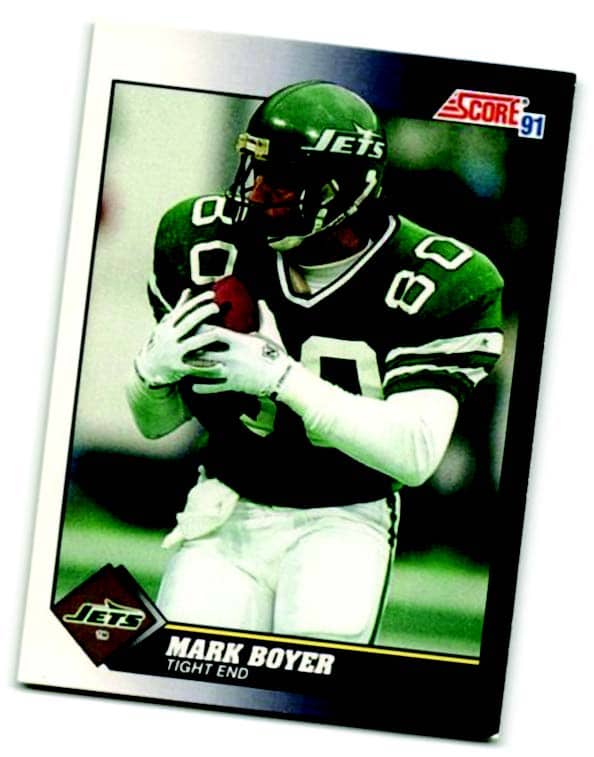Mark Boyer’s Journey from the sandy beaches of Southern California to USC and then the NFL. In his words, he details his experience with players, both present and past, on money habits, pay, and investing.
Oh, how times have changed … and have not changed at the same time!
Even though I grew up on the beaches of Southern California, football was always a passion at Edison High School in Huntington Beach. As a former quarterback converted to tight end, we won the CIF championship my senior year 55-0.
My journey took me to USC where I played for five years, majoring in finance. It was there my personal interest in managing money and helping people began. God had other plans in the near term! I was drafted in 1985 by the Indianapolis Colts in the ninth round.
My 1985 rookie contract was about $72,500 with a $25,000 signing bonus in 1985. Pick 229 in last year’s NFL draft had a base salary was $705,000 with a $104,780 signing bonus. Which is about 6.4% year-over-year growth in salary for my draft position.
I remember getting my signing bonus when I got to rookie camp with the Colts, I had yet to get a game check or officially make the team. After a pre-season game in Denver, my coach knew my wife, Janna, was pregnant with our first daughter. He allowed me to fly home after the game to check on her if I was back by Monday morning.
Importance of Fans
Janna and her father had found a house in Huntington Beach for $140,000 and we were excited at the prospect of starting our family in this new home. During that trip to check on my wife, we ended up sitting down with a mortgage broker and purchased the home. I’m still surprised to this day he approved our loan—at 12%, ugh! —even though I technically had yet to make the team and had no income! Luckily for me he was a big football fan.
In my opinion, the human desire to take care of family is still ingrained in us. This is a commonality I’ve found working with current and former players. We all want to have security and a roof over our heads.
My primary goal with my NFL money was to be able to purchase a home in Southern California. If I did that and nothing else, that was a win. Immediately earning such a big (at the time) paycheck as a 22-year-old felt like having “Monopoly money.”
Even as a ninth-round draft pick, being able to afford an expensive purchase on a whim felt like nothing and I wasn’t even a “1st Rounder” making the “really big” money at the time. Still, we were ahead of our peers in the same age group, and it was tempting to lose perspective. Things haven’t changed to this day. We still hear of athletes at all income levels throwing away hundreds of thousands or even millions on seemingly “smart investments” that fall through because of the quick and large nature they earn in their paychecks.
Bonuses are instant, salaries are condensed into weekly checks during the season only. The money isn’t earned or saved over years of hard labor like the rest of America’s workers. Learning to respect the value of money is the challenge for us athletes blessed to play a game for work.
Even though athletes may have more access to information these days, a recent study shown on ESPN’s 30 for 30 called “Broke,” those who have been retired for two years, 78% of former NFL players have gone bankrupt or are under financial stress. That financial weakness is concerning and astonishing, leading me to the importance of a “circle” of trusted advisers.
Tax Man
There are two things certain in life … death and taxes. When I picked up my first check, I couldn’t wait to put my hard-earned money to work. As I opened the envelope and saw how much taxes were withheld, I was astonished, and a bit upset. The tax man took a chunk out of my salary!
Now I had a degree in finance and was well-versed in taxes, but until you see the effect of it on paper, it’s not as real. This “punch to the gut” feeling is all too familiar with today’s (and my era’s) players. Thus, they want to try and mitigate as much tax liability each year as you can.
In my day, this mitigation resulted in illiquid investment deals with ways to “shelter” income from taxes using a loophole (legal of course). The government ended up changing the tax laws which made this type of operation no longer viable, costing hundreds of thousands to players.
In today’s era of the NFL, I think the ability to be involved in scams can happen, though less frequent with the amount of compliance and oversight on agents, financial advisers and CPAs. Look at the FTX platform that lost $5 billion of customer funds including famous athletes, celebrities and sponsors.
I found it important to surround yourself with a circle that you trust and that also has your best interest at heart. For example, when I went into the league, I already had my financial adviser lined up because we went to church together. We had already built that relationship prior to me making it in the league.
I think this cannot ring truer today, especially with the NIL (name, image, likeness) rules affecting high school and college players ability to make a substantial amount of money before they even turn pro (if they do). Having the wherewithal to make good choices is closely related to the circle you keep.
Better Educated Players
From my experiences being in the Colts and New York Jets locker rooms, we never had the financial education or access to it like most players do today. Google was not a thing, and financial advisers were not as readily available.
The NFLPA at that time didn’t have an approved list of vetted firms that we could speak with to educate us on our financial decisions.
From the athletes I have worked with, many are more educated on the general types of investments available. In my opinion, that’s the power of easy access to information that we have today.
At this year’s Super Bowl, scheduled for Feb. 12 in Glendale, Ariz., each player will make a nice bonus. Last year, each Los Angeles Ram earned $150,000 while each Cincinnati Bengal made $75,000. While I never went to the Super Bowl, if a player with a long-term time frame invested (hypothetically speaking) his game bonus ($75,000 minimum) into diversified growth fund with a solid track record earning approximately a 10% return year-on-year, that will turn into about $504,000 in 20 years, a nice result for one game.
While certain things have changed in the last almost four decades since I was drafted; the scams, view of money, and sometimes reckless spending still unfortunately happens. Working with professionals in their own fields can often negate the tough times brought upon by poor financial decisions.
—
Important Disclosures:
The opinions voiced in this material are for general information only and are not intended to provide specific advice or recommendations for any individual.







